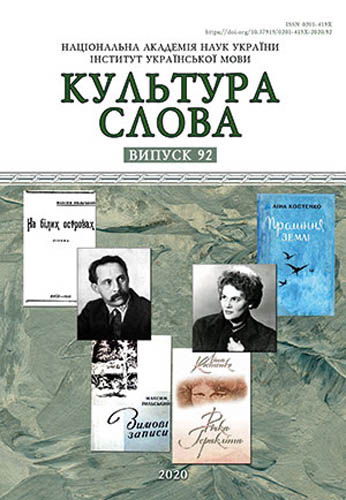Institute of the Ukrainian Language of the National Academy of Sciences of Ukraine
Institute of the Ukrainian Language of the National Academy of Sciences of Ukraine (Інститут української мови НАН України; Instytut ukrainskoi movy NAN Ukrainy). Scientific research institute at the National Academy of Sciences of Ukraine established in 1991 in Kyiv out of several research departments of the Institute of Linguistics of the National Academy of Sciences of Ukraine specializing in the study of the Ukrainian language. Its forerunners include the Institute of the Ukrainian Scientific Language of the All-Ukrainian Academy of Sciences (1921–30) founded on the basis of terminological commissions of the Ukrainian Scientific Society in Kyiv (1907–21), and the Orthographic and Terminological Commission of the All-Ukrainian Academy of Sciences. The institute co-ordinates all research related to the Ukrainian language in Ukraine: its social functions, dissemination, normativeness, structure, history, and cultural significance. Its social mission is to strengthen the role of Ukrainian as the state language in Ukraine.
The institute’s priority areas of research include: structure and contemporary condition of the Ukrainian literary language, including its vocabulary, grammar, norms, and codification; development of terminology; social, professional, and territorial differentiation of the Ukrainian language; sources of its formation and historical development of the Ukrainian language; onomastics of Ukraine; connections of the Ukrainian language with other Slavic languages and non-Slavic languages in different historical periods. It serves as a working organ of the Ukrainian National Orthographic Commission and the Scientific Terminology Committee of the Presidium of the National Academy of Sciences of Ukraine. One of the institute’s major ongoing projects is the compilation of the Ukrainian dialects phono-fund which describes dialects in synchronic and diachronic terms and shows their relationship with the literary language and with each other. The institute’s scholars also participate in the longtime international megaproject Zahal'noslov’ians'kyi lingvistychnyi atlas (The All-Slavic Linguistic Atlas, 1965–). The institute’s another focus is on the study and publication of medieval and early modern linguistic monuments. Commented editions of literary sources include Ievseviieve ievanheliie (Eusebius Gospel of 1283, 2001), Peresopnyts'ke ievanheliie (Peresopnytsia Gospel of 1551–61, 2011), Ukraїns'ka Chetia 1489 r. (The Ukrainian Menology of 1489, 2015), Vasyl Nimchuk, comp., Ukraїns'ka mova X–XIII st.: khrestomatiia (The Ukrainian Language of the 10th-13th Centuries: A Reader, 2015); and Akty Poltavs'koho polkovoho sudu 1683–1750 rr. (Actae of Poltava Regimental Court, 1683–1750s, 2017).
The institute has five research departments: grammar and scientific terminology; history of the Ukrainian language and onomastics; lexicology, lexicography, and structural-mathematic linguistics; stylistics, language culture, and sociolinguistics; and dialectology. It has a research staff of more than 55. It also owns a unique lexical card index (6 million entries), an audio library of the contemporary Ukrainian language (with more than 60 hours of phonation) and other languages (including Russian, Polish, Czech, and Slovak), and the speech recordings of prominent Ukrainian intellectuals (among them Leonid Bulakhovsky, Maksym Rylsky, and Yevhen Kyryliuk).
Among the institute’s most notable publications are: Frazeolohichnyi slovnyk ukraїns'koї movy (Phraseological Dictionary of the Ukrainian Language, 2 vols, 1993); Rosiis'ko-ukraїns'kyi slovnyk naukovoї terminolohiї (Russian-Ukrainian Dictionary of the Scientific Terminology, 3 vols, 1998); Slovnyk synonimiv ukraїns'koї movy (Dictionary of Synonyms of the Ukrainian Language, 2 vols, 1999); the encyclopedic volume Ukraїns'ka mova: 1945–1995 rr. (The Ukrainian Language, 1945–1995, 1999), published together with the Institute of Linguistics of the National Academy of Sciences of Ukraine and the publishing house Ukrainska entsyklopediia; Ukraїns'ko-rosiis'kyi slovnyk (Ukrainian-Russian Dictionary, 2004); Atlas ukraїns'koi movy (Atlas of the Ukrainian Language, 2006), awarded State Prize of Ukraine in Science and Technology; Suchasnyi slovnyk inshomovnykh sliv (Contemporary Dictionary of Foreign Words, 2006); Mala filolohichna entsyklopediia (Small Philological Encyclopedia, 2007); O. Zaretsky, Ofitsiinyi ta al'ternatyvnyi dyskursy. 1950–80-ti roky v URSR (Official and Alternative Discourses: 1950s–1980s in Ukrainian SSR, 2008); O. Danylevska, Mova v revoliutsiї ta revoliutsiia v movi: movna polityka Tsentral'noї Rady, Het'manatu, Dyrektoriї UNR (Language in the Revolution and Revolution in Language: Language Politics of Central Rada, Hetman government, and Directory of the Ukrainian National Republic, 2009); Rosiis'ko-ukraїns'kyi slovnyk (Russian-Ukrainian Dictionary, 4 vols, 2010–14); Slovnyk ukraїns'koї biolohichnoї terminolohiї (2012); Lesia Stavytska, Hender: mova, svidomist', komunikatsiia (Gender: Language, Consciousness, Communication, 2015); Slovnyk ukraїns'koї movy: 2-e vyd. (Dictionary of the Ukrainian Language: 2d ed., 2016); Ukraїns'kyi leksykon kintsia XVIII – pochatku XXI st.: slovnyk-indeks: u 3-kh t. (Ukrainian Lexicon of the 18th–early 21st Centuries: Index Dictionary in 3 vols, 2017); and Larysa Masenko, Konflikt mov ta identyhcnostei u postradians'kii Ukraїni (Conflict of Languages and Identities in Post-Soviet Ukraine, 2020). It publishes several academic periodicals, including the quarterly journal Ukraїns'ka mova (81 vols, 2001–) and the periodic compendiums Kul'tura slova (95 vols, 1967–), Leksykohrafichnyi biuleten' (29 vols, 1951–62, 2004–), Terminolohichnyi visnyk (6 vols, 2011–), and Studiї z onomastyky ta etymolohiї (2005–). The institute’s directors have been Oleksandr Taranenko (1991–98), Vasyl Nimchuk (1998–2008), and Pavlo Hrytsenko (2008–).
BIBLIOGRAPHY
Instytut ukraїns'koї movy: istoriia ta suchasnist' (Kyiv and Kharkiv 2011)
The Institute’s official website is https://iul-nasu.org.ua/
Serhiy Bilenky
[This entry was written in 2022.]
